Photos by Valerio Berdini
Faust
Saturday mornings should be dedicated to the re-charging of the depleted bodily batteries that have run down over the course of the previous five days, not to an exercise in mild panic competing against the clock. Nor should they be spent wondering why the police can’t deployed to more use – ie solving worthwhile crime – rather than hassling hapless hipsters with sniffer dogs over a bit of weed. But most importantly, they shouldn’t be trying to work out who is responsible for scheduling something quite as magnificent as Faust’s set at the ungodly hour midday.
Speaking to The Quietus after the show, guitarist James Johnston (yes, he of Gallon Drunk’s parish) runs his fingers through his hair and laughs in incredulity at the sheer madness of putting these sonic pioneers at stupid o’clock. [we thought it was a brilliant idea, get the day off to a bracing start – ED]
Despite such logic-defying logistics, this incarnation of the Krautock legends – that’ll be bassist-vocalist Jean-Hervé Péron, drummer Zappi W. Diermaier, keyboardist Geraldine Swayne, the aforementioned Johnston and Gallon Drunk trumpeter Terry Edwards – shows that it’s as much ahead of the pack as their previous guise was at the beginning of the 70s. Bold, daring and pushing boundaries into several dimensions way beyond our own, Faust demonstrate the power of the imagination and its ability to not only push preconceived musical barriers but also trample them under foot. As the final pulses of ‘Krautrock’ usher their thrilling set to a breathless close, those lucky souls to have made it out of bed know that they’ve witnesses something quite remarkable and utterly special. Julian Marszalek
Toy
It’s 12.55 on The Quietus Village Mentality stage and already the best-male-hair stakes have been set staggeringly high. Bass player Maxim Barron sports a particularly huge mane. Volume is the order of the day, not just in matters of trichology but also of sound, as two heavily effected guitars and a swooping synth make Toy a loud beast, fresh from supporting the Horrors on tour.
Singer Tom Dougall is possessed of a voice that simultaneously recalls Lou Reed / Dylan and Ian Curtis. Second track, ‘Bright White Shimmering Sun’ bursts out of the gate with a monster pop riff, before breaking down into verses built from a start-stop drum pattern and Dougall’s Curtis-esque phrasing. ‘Clock Chime’ opens with a fast picked guitar pattern, which is suddenly smashed by the surprise entry of a slow lumbering groove. Lyrics such as "they kissed in front of me” are subject to a deadpan delivery that sees Dougall mining a bad trip as much for its humour as its pathos. Another track adds a Krautrock groove to their Wire/ shoegaze dynamic, and culminates in an epic ending. Above all, it’s the combination of psychedlia and Kosmiche with a dark post-punk lyrical edge that already marks out Toy as an intriguingly fully-formed entity. Ralegh Long
Electrelane & Konono No.1
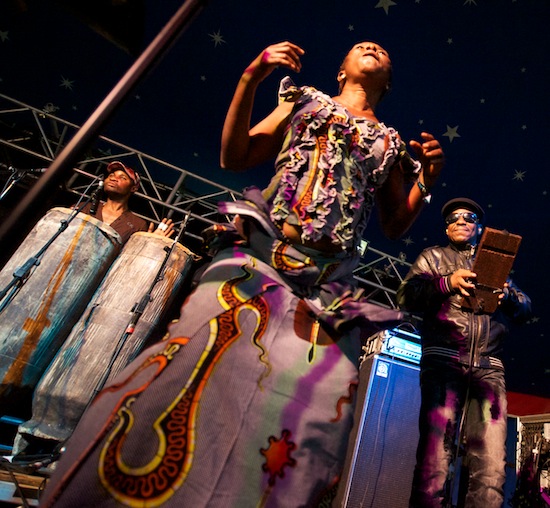
On the Eat Your Own Ears stage Electrelane fall back into their well-earned role of ‘festival highlight band’ with ease, after returning from a hiatus that has seen them out of action since 2007. Benefitting from some surprisingly meaty amplification (Victoria Park festivals are normally notorious for their low volume) their trademark atmospheric pile-driving whoosh stamps its authority on the mid-afternoon. Frontwoman Verity Susman provides plinky-plonky piano scales, burrowing organ lines, and white-as-a-sheet vocals that come on like ghosts caught in a gentle yet destructive coastal storm. It isn’t quite the heady vortex of emotion and reignited passion that was last month’s reunion gig proper at the Scala, but its enough to warrant their return a seamless catalyst for joy in the same way Pulp’s has been. In particular it is a treat to hear the subtleties of Mia Clarke’s guitar playing again. Her move to Chicago (where she has formed the experimental band Follows) seems to have made her an even more able guitarist than she was before, playing with feedback and distortion like candle wax at a dinner party. The band’s cover of Bronski Beat’s ‘Smalltown Boy’, sees them swerve into sweaty, hot-blooded disco, before careering away again on their impulsive flight; they grow the more the set goes on, merging with the dramatic grey skies above them. It feels so good, you’d be mad to leave early – or at least desperate to see the brilliant Konono No. 1.
The bazombo trance group (today coming in the form of a sextet) from Kinsasha in the Democratic Republic of Congo inspire arguably the biggest reaction of the day in terms of dancing. The lineup of two drummers, female singer and percussionist, and three electronic likembe (thumb piano) players are led by Augustin Mingiedi, son of Mawungu, the man who formed the band during the 1970s. Arriving late and squeezing into the front row, it takes a little while but before long the incessant complex web of rhythm, and dancing likembe and vocal melodies take over. They don’t call it trance for nothing: noted for the repetition of their music, it feels like they play one long song with a few breaks. It is the key to keeping the tempo up, and by midway through the set the majority in the Village Mentality tent are moving as the musicians calmly get on with what they have been doing for years. The crowd dances without thinking as if stamping out the relevance of that silly term, "world music". Tim Burrows
Omar Souleyman
Omar Souleyman’s an itinerant Syrian wedding singer who, along with his mate on a sole Casio, plays a strange, sparse desert rave music, but I’m kind of bored of that story now. Or not bored of it, exactly, but it does seem less novel, given the amount of the internet given over to wacky wedding dance videos made by middle class American people. (Why do so many people do that? I had no idea the crossover between OK GO! fans and Gleeks was so vast.) Omar’s garb seems a little less exotic, too – something I’m going to lazily attribute to the widespread and (well-deserved) coverage of the Arab Spring in the UK media. But – and I think the Quietus’ stated love for the man in the keffiyeh and the sunglasses should make this next part obvious – this is A Good Thing. Now the novelty’s been stripped away, people can enjoy Omar’s music for what it is; an intoxicating meeting of sturdy low-end and snaking high-end frequencies, united by his voice, in reverb, shouting about things we don’t know and "Yeaaaaaaaaaaaah!" Kev Kharas
Ariel Pink
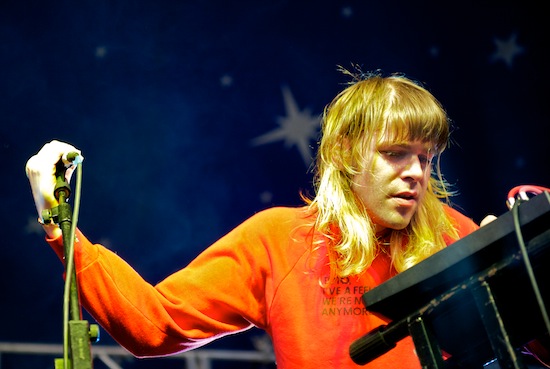
It’s clear after a cursory look at the crowds gathered outside the Field Day gates that a short back and sides has become the de-rigueur look for a large strain of the East End’s culture-vultures. Ariel Pink clearly didn’t get the memo as he steps onto the stage of a packed-out Village Mentality stage sporting a poorly cropped late 70s shag that’s as much Daryl Hall as it is the entire line-up of the Runaways, feathered bangs and all. It’s a mixed bag of vintage influences in hair form, reminding us of a million references from our youth and achieved via what is visibly the cheapest haircut we’ve seen for some time.
The ‘do is brazenly off-key but it’s also utterly mesmerizing and is a hirsute reminder of just why Pink and his AM/FM world hold such a strange appeal to the many gathered to watch him today. Backed by a group of equally sartorial mavericks, Pink leads his merry band of dime-store soft rockers through the bulk of last year’s Before Today, with every opening note eliciting loud whoops from the mid-afternoon crowd. And when the opening notes of ‘Round and Round’ cause the normally stoic locals to throw their arms in the air and sing along, all critical thoughts of retromania are abandoned as we openly embrace the mix of utter gaucheness and glorious pop perfection paraded before us. Charles Ubaghs
Mark Kozelek
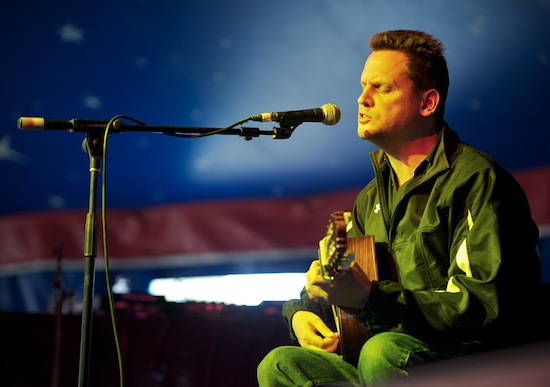
A lot of people turned out for Mark Kozelek. Despite a number of people talking (over a rather quiet mix) this was an impressive reminder of the cult esteem within which Kozelek is held. A particularly dedicated throng lined the front row and the centre of the audience, whose applause gave the impression that many of them had come to Field Day just to see this.
Kozelek is about as unassuming a solo artist as you can get. He sits centre stage, playing a classical guitar, dressed in what can only be compared to the sort of all-weather coat that a rower might put on after a race. But by the time he plays ‘Heron Blue’, even the talkers amongst the audience are listening. He fingerpicks a mesmerizing pattern, and sings with the kind of voice that you can imagine lasting forever; it’s so effortless and rich.
And then the noise of drums rises from a nearby tent, and stays at a level that’s distracting even for the audience. Kozelek has noted it too. He compares trying to play his songs against the noise to “trying to have sex with somebody who’s on the telephone.” The audience erupts in laughter at the shared frustration, but after two attempts to start the next song suddenly everything hangs in the balance – will he just stop? But once he’s off again a beautiful, yearning ‘Carry me Ohio’ gets the loudest cheers yet. The audience couldn’t be more onside, willing him in his battle. And he pulls it off with complete dignity. When a synth-line from the nearby stage dive-bombs across his song he just breathes into the mic and the whole audience laughs, then he silences them by climbing the chorus melody again. Not an easy show, but a good one. Ralegh Long
John Cale
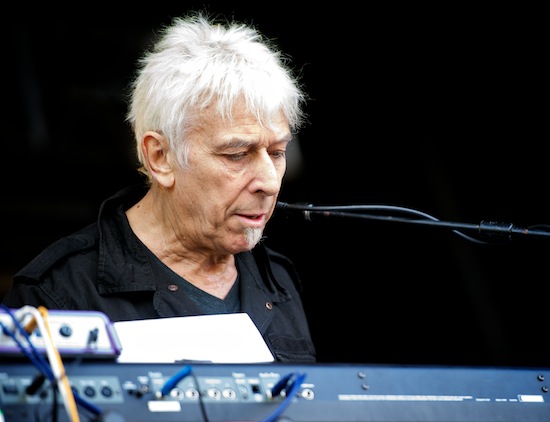
It’s hard to say what’s more disappointing: the amount of supposedly clued-in people standing around scratching their heads and asking who the hell John Cale is or the former Velvet Underground’s co-founder obtuse and lacklustre set. At 69-years-old, Cale is fine shape. His shock of white hair acts a beacon and that rich baritone of his is as strong as ever, knocking Lou Reed’s recent creaky efforts into a cocked hat.
Indeed, Cale’s solo efforts over the last decade or so have proved to be far more interesting and satisfying than his former partner’s – just check Hobosapians’ and ‘Black Acetate’ for evidence – but as a festival turn, his performance today is too obtuse to maintain interest over the course of 45 minutes. Electing to promote a large chunk of his yet-to-be released EP, Extra Playful, the unfamiliarity of tracks such as ‘Whaddya Mean by That’ and ‘Castratofunk’ and their forays into programmed beats and ill-advised attempts at rapping mean that Cale’s efforts are hard to grasp in a setting such as this. On the plus, his reading of ‘Heartbreak Hotel’ is still as disturbing and upsetting as it’s ever been. Julian Marszalek
Ducktails
Matthew Mondanile does well to infuse Real Estate’s beach pop with a hearty Balearic guitar twang, and as Ducktails he has explored his own particularities over three steadily stripped-back volumes.
If January’s Ducktails III: Arcade Dynamics stands as a forward step in this process of deconstruction, his shambolic live displays are anything but. Devoid is the usual muscular tonality found in the albums’ breezy hypnagogia: this year’s performance in the festival’s laptop music-abound Blogger’s Delight base was home to wantonly tacked-on pop culture nuggets (Martin Solvieg and Dragonette’s R&B airplay whore ‘Hello’ blasted from a bedraggled stream – much to its most unlikely of fans’ glee – was just one of the festival’s surprisingly plentiful slapstick highs) and technical difficulties (three quarters of it was vocals-deprived, volatile mics laying bare Mondanile’s Tropicália trilling to a wash of aghast, if oddly entertained, faces).
Though even for regularly returning Mondanile lauders some of the set was admittedly difficult to stand still through, it was also an impossible event to abandon altogether. So compulsively fascinating was his twitching creativity, his visible stress and his desire to confound; often splicing rhythms against rhythms, melody lines over melody lines and laptop sounds over guitar sounds over sampled drumming, that most in attendance were left wanting to leave yet knowing, in thrall to such unforgiving eccentricity, that they were in no way able to. Jack Mills
The Sea and Cake
The Sea and Cake have been together since the mid 1990s, and really know how to lock in. They’re doing it right from the word go, if only the mix would do them justice. John McEntire’s celebrated drumming is great, but the harsh cymbals and snare seem to drown out the twin guitars of Sam Prekop and Archer Prewitt.
Prekpop and Prewitt trade breezy jazz-inflected chord voicings and Eric Claridge plays insanely complicated fingerstyle bass, but it’s hard not to feel that the subtleties of what they do is a little bit lost on a festival stage. They need the warmth that records like ‘Oui’ and ‘Car Alarm’ possess. That said, and in front of a slightly disappointing turn out, they just go right in and do what they’ve been doing for years with incredible panache.
They’re at their most poppy when Prekop and Prewitt sing together – an octave vocal approach that’s kind of a Sea and Cake signature. They also manage to slow down in sync for a few bars in the middle of the opening of their final track, and there are moments of euphoria mostly courtesy of Prewitt, who rips some insane slide / feedback lines from his Danelectro. Ralegh Long
Darkstar
Continuing the day’s visual gag vibe at Blogger’s Delight, Darkstar’s set couldn’t help but be fitfully hilarious in part. On record, the addition of friend and vocalist James Buttery works in rebranding duo James Young and Aiden Whalley’s sound as flattened out, nocturnal melodicism. As such, their sets are usually pitched in a consuming darkness with blue and purple lights feathering a stage of wires, members and tools.
An evocative crowd atmosphere for music so unflappably murky and mood-setting is something that brings the best out of a Darkstar show. A mid-afternoon set, leaving their marketed, faintly elusive appearance exposed to the public’s gawp wasn’t ever going to be an easy ride for the three, let alone against a constant drone of crowd talk. The unfurling awkwardness through slow-burn midnight pop numbers ‘Deadness’ and ‘Gold’ played out like a Brent scene from The (UK) Office, with Young’s bearded face lancing angrily through the synth woozes like a finger, chest-poking a disenchanted audience.
Still, their sculpted new sound, which seemed to both polarise existing fans and pick up hordes of fresh ones off the back of last year’s debut LP North, was executed with a military precision. Against all odds, Buttery squeezed an ounce of life out of a floundering vessel, and, by the end, had succeeded in spinning it around altogether. Jack Mills
Anna Calvi
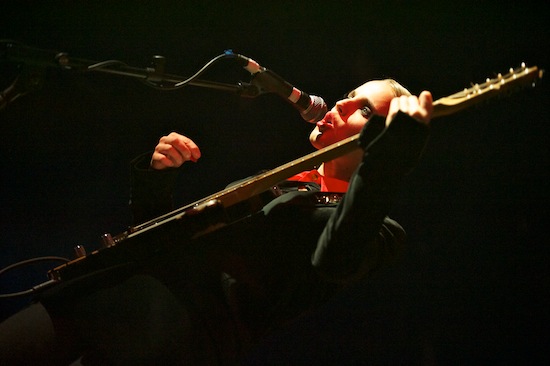
A Mercury nom plus a sudden and well-timed downpour means the Village Mentality tent is filled to the brim before the start of Anna Calvi’s set. Throwing out the haunting western tones of ‘Rider to the Sea’, Calvi’s formidable guitar skills are equally matched by her vocals as she coolly plucks and struts her way through her debut’s finest moments.
While cries of early PJ Harvey have been thrown at the diminutive singer, there’s little of Polly Jean on display. Calvi’s spiritual ancestors are more French chanson than voodoo blues and les influence Francais are set to maximum as Calvi fuses a large dose of Edith Piaf to her dark, atmospheric rock and roars her way through album highlight ‘Desire’. It’s too soon to label Calvi the new queen of noir for now but left with nothing but a dazed grin on our face and a sudden craving for a Gitanes post set as we leave the tent, the crown is clearly within Calvi’s reach. Charles Ubaghs
Michael Mayer
Night starts to fall as the God-King of minimal house and head ambassador for the German dance scene takes to the stage in Bugged Out’s packed tent. Once upon a time such an event would have been met with great reverence. This is, after all, the guy behind the innovative Kompakt label and creator of Immer, the mix responsible for many a spiritual experience circa 2002. But dance music is as fickle as fashion and tonight’s crowd is itchy and frantic. Mayer’s style has been appropriated by so many successors since Kompakt’s heyday that tonight’s set of mid-tempo tech-house just doesn’t have the impact it might once have had. This isn’t helped by a surprising lack of oomph coming from the soundsystem, perhaps no fault of his own.
Nevertheless, it takes a good while for Mayer to win his crowd over – an otherwise confused pinball of bodies unwillingly trampling and elbowing each other in a bid to have a great time. ‘C’mon, get into the vibe!’ a raver goads-on his mates, only half sarcastically. But his fellow dancers remain unfocused, more concerned about not tripping over each other’s feet to be encouraged into dancing as a single unit. This is an inherent problem with dance tents at festivals. While the indoor environment helps recreate the clubbing atmosphere, the immense crush to get in can result in extreme difficulty in expressing oneself. The freeform joy of dancing becomes a confused and uncomfortable scrum – quite the opposite of what a dance experience should be. Whatever happened to raving outdoors? It would be great if festivals could take the lid off of dance tents and let the music (and crowds) breathe a little easier. Charlie Frame
Gruff Rhys
Watching Gruff Rhys play a truncated headlining set at The Quietus’ stage is a strange experience. Anyone familiar with his solo shows – and indeed those of the still on-ice Super Furry Animals – will know to expect props, contraptions and an epic running time but even playing at a fraction of his usual length, Rhys still packs more ideas, humanity and compassion than most bands will in a lifetime.
Ably backed by Welsh surf band enthusiasts Y Nwl, Rhys’ endearing stage presence – part shambling shaman, part loveable everyman – does much to compensate for the dense mix emanating from the PA and his readings of ‘Honey All Over’, ‘Shark Ridden Waters’ and an exuberant ‘Sensations In The Dark’ do much to ensure that his status a national treasure is kept firmly intact. Yet be that as it may, Rhys’s return to his bandmates to continue their ongoing journey into the furthest reaches of inner and outer space can’t come quick enough.
Julian Marszalek
Glasser
As you’d expect when some black and white striped siren descends from another planet to pay a visit, the arrival of Glasser to the small stage of the Schackwell Arms results in much excitement and confusion. The latter is largely due to a late start time and the fact that the stage is set low to the ground, meaning that only those at the very front get a clear view of Glasser, aka Cameron Mesirow. Not that it stops the New York resident from filling the tent with her cyborg Enya vocals during the very last set of the night. Swaying back and forth across the stage and singing to a backing track of her own vocals, Mesirow dangerously balances herself on the edge of a cliff signposted ‘new age noodling’, before pulling herself back from the brink with layers of sub-bass and post-Merriweather tribal rhythms. It’s a hypnotic spectacle on first impression but with Factory Floor exploring a far more threatening, synapse shredding use of electronics on the same stage just an hour prior, it also never fully embraces the potential glimpsed on Glasser’s recent debut. Instead, everything squelches aimlessly to a close and we in turn do the same as we head off into the night in search of a night bus home. Charlie Frame



